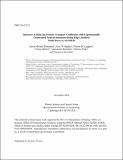Inference of Main Ion Particle Transport Coefficients with Experimentally Constrained Neutral Ionization during Edge Localized Mode Recovery on DIII-D
Author(s)
Rosenthal, Aaron M.; Hughes, Jerry W.; Laggner, Florian M.; Odstrcil, Tomas; Bortolon, Alessandro; Wilks, Theresa M.; Sciortino, Francesco; ... Show more Show less
Download22ja031_full.pdf (1.733Mb)
Metadata
Show full item recordAbstract
The plasma and neutral density dynamics after an Edge Localized Mode (ELM) are investigated and utilized to infer the plasma transport coefficients for the density pedestal. The LLAMA diagnostic provides sub-millisecond profile measurements of the ionization and neutral density and shows significant poloidal asymmetries in both. Exploiting the absolute calibration of the LLAMA diagnostic allows quantitative comparison to the electron and main ion density profiles determined by charge-exchange recombination, Thomson scattering and interferometry. Separation of diffusion and convection contributions to the density pedestal transport are investigated through flux gradient methods and time-dependent forward modeling with Bayesian inference by adaptation of the Aurora transport code and IMPRAD framework to main ion particle transport. Both methods suggest time- dependent transport coefficients and are consistent with an inward particle pinch on the order of 1 m s^{−1} and diffusion coefficient of 0.05 m^2 s^{−1} in the steep density gradient region of the pedestal. While it is possible to recreate the experimentally observed phenomena with no pinch in the pedestal, low diffusion in the core and high outward convection in the near scrape-off layer are required without an inward pedestal pinch.
Description
Submitted for publication in Nuclear Fusion
Date issued
2022-11Department
Massachusetts Institute of Technology. Plasma Science and Fusion CenterJournal
Nuclear Fusion
Publisher
IOP
Other identifiers
22ja031